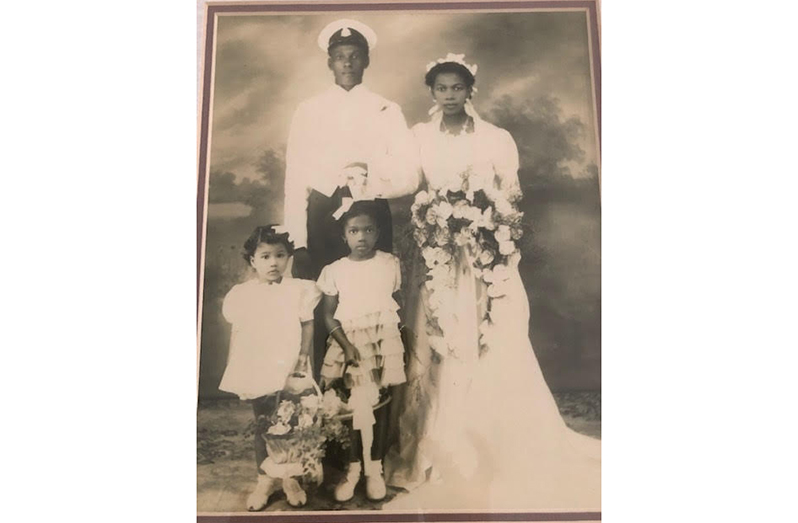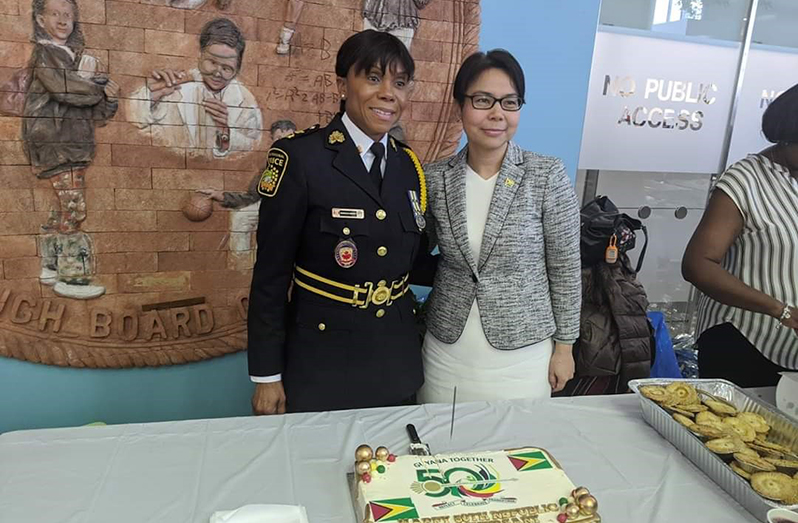Guyana-born law enforcement worker retires with satisfaction
By Frederick Halley
IN 1981, Guyana-born Ingrid Pellew-Berkeley was disqualified from joining the then Metropolitan Toronto Police Force (MTPF) after failing to meet the mandated height-to-weight ratio for prospective applicants.
“Setback but undeterred, I got married, started a family, joined a gym, continued my studies and advanced to a management position in a service station.”
Ingrid resumed the application process five years later, not limiting her prospects to one police force. “I applied to several police forces, including the MTPF, Ontario Provincial Police (OPP), Royal Canadian Mounted Police (RCMP) and the Peel Regional Police (PRP).
“After successfully completing the written and physical testing with all four forces, I was invited to interview with the OPP, MTPF and the PRP. Peel Regional Police was the first agency to call and offer me a position, and so began my journey in policing, Ingrid told the Sunday Pepperpot in a recent interview.
In 2020, following a distinguished and illustrious 33-year career with Peel Regional Police, Ingrid retired as Deputy Chief of Police.
“Although the number of female officers in supervisory and senior positions has increased significantly in recent years, female officers of colour continue to lag behind. Policing continues to be a male-dominated profession. With the exception of my promotions to Superintendent (2016) and Deputy Chief (2018), I had to apply for every other promotion two or three times,” she explained. “In my rank of Superintendent and Deputy Chief, I had the honour of being the highest ranking Black female police officer in Canada. Accordingly, my promotions to the ranks of Superintendent and Deputy Chief gave me the honour of being the highest-ranking Black female police officer in Canada. These experiences stressed the importance of a mentor, someone for guidance whether personal, career-centred, or a melding of the two.”
Recalling her journey in PRP, Ingrid disclosed that she was the only Black female recruit in her class of 32, the only female with a child (a three-year-old son) and one of the older recruits. “At the Ontario Police College (OPC), I was one of only two Black females in an intake of 300 recruits. Success at OPC meant developing friendships and building trust with individuals who were so different from me in so many ways.

“I went from being surrounded by family and friends who were Blacks of Caribbean, Canadian or African descent to being immersed in a predominantly Caucasian environment. Stepping out of my comfort zone was difficult but I used the opportunity to teach others about my culture and I took the time to learn about theirs. Some of my instructors were not always pleasant; I felt that I was subjected to bias appraisals coupled with a lack of empathy from a predominantly male Caucasian teaching and administrative staff. On the contrary, the camaraderie and support of my classmates were always enjoyable and contributed to my success at OPC.”
According to Ingrid, “my journey with Peel Regional Police stretched beyond the realm of just being a job; it was life-altering. I was the first and only Black female Police Constable on the job for approximately one year and though it was not always easy, quitting was not an option. As a Recruit Constable, my experiences with my Field Training Officers and Platoon mates were very positive. As one of two to three females on the Platoon and one of two Black Officers, I always felt included in Platoon activities.”
Influenced through experiences, Ingrid disclosed that she was working the night shift (spot checks known today as Reduce Impaired Driving Everywhere “RIDE”) in December 1988 and was assigned to traffic control at the scene of the fatal shooting of Michael Wade Lawson, a 17-year-old old Black youth who was shot and killed by two Caucasian Peel Regional Police Officers.
“The resulting anger and mistrust towards the police by some in the Black community determined my path in my policing career. Working to effect change and strengthen community police relationships at the rank of First Class Constable, I made conscious decisions to apply to the (then) Community Services Bureau in 1990 and to the (then) Race & Ethnic Relations Bureau in 1992.
“These were not highly sought-after positions and were viewed as ‘soft social worker type positions.’ Ironically, these two positions were the most influential to me in my role as a police officer. They provided me with greater insight, empathy, deep introspection and the mechanisms necessary to be an effective police officer and leader. These positions were critical to engaging and building trust with the emerging diverse communities,” she said.

Moving up the ranks
“My progression through the ranks proved to be challenging. Whether it was not being selected for transfers to sought after positions or for promotion; being one of a handful of females Officers in corporate settings or simply feeling outside of my comfort zone as the sole Black female Officer in many environments, it was through persistence and determination learned from childhood that I was able to overcome and persevere,” Pellew-Berkeley continued. “There were many obstacles but I was determined to overcome them. Intent on succeeding and having a seat at the decision-making table, I worked twice as hard as my peers to survive and be heard. I reached outside of my police service to develop the leadership competencies required for success. This included acquiring my Masters Degree in Leadership from the University of Guelph and acquiring external mentors who opened pathways to information and opportunities amongst others.”
Growing up
Ingrid is the youngest of 11 children. She was born in 1960 in Georgetown, Guyana. She pointed out that her mother Walterine Pellew, was a homemaker and father, Cardwell Pellew, was a police officer. “My father passed away in Guyana in 1966 when I was six years old, leaving my mother with nine children; one sister predeceased my birth and one brother passed away when I was about two years old.
“As a child, I recall the struggles and determination of my mother, following my father’s death, to maintain a healthy, happy, financially stable family union. Apprenticed at an early age to a seamstress, my mom utilised her sewing and hairdressing skills to support her family. Testament to her abilities, the local villagers sought her out to design and sew their clothing and to style their hair. Characteristics of her true grit were her perseverance, resiliency, attention to detail and her empathy.
“In 1968, my eldest sister was gainfully employed with Guyana’s Ministry of Agriculture as Secretary to the Permanent Secretary. She immigrated to Canada, creating the pathway for my mom and members of my family to immigrate to Canada.
“Sponsored by my eldest sister in 1972, my mom immigrated to Canada leaving me in the care of a maternal aunt. She then travelled to the USA where she was a domestic worker. In 1973, she returned to Canada and began the sponsorship process for her two dependent children and me.”
In 1974, accompanied by two siblings, Ingrid migrated to Canada, where, apart from attending school, she worked part-time at a gas station and after gaining full-time employment, commenced her post-secondary studies through Continuing Education (night school) at Seneca College where, in 1984, she obtained an Honours Diploma in Social Sciences.
Life ahead
“Retirement provides me the opportunity to continue my volunteer work to end systemic racism and to advance social and equitable futures for members of the Black, marginalised and underrepresented communities. Annually, I sponsor scholarships for two students graduating Grade 12 who identify as Black or members of Caribbean heritage. Reaching beyond and working with local organisations, I see this as my legacy an extension from my service with the Peel Regional Police.”
Ingrid is currently employed with the Law Society of Ontario as a lay adjudicator. She also sits on the executive for the Association of Black Law Enforcers, and the board of Peel Family Mediation Services and is a member of the Guyana Ex-Police Association of Canada (GEPAC) and the Caribbean Canadian Association of Waterloo.
Ingrid has also been recently nominated and selected as a 2023 inductee into the Waterloo Region Hall of Fame. The formal programme will be held on Sunday, April 30.
“Today, I stress that I became the person I am because of the foundation I received in Guyana. It provided me with the strength to overcome many obstacles and to stay the course to achieve my goals. I have never shied away from acknowledging my Guyanese heritage and sharing what I know and recall of my early years,” she said.
Ingrid is married and is the mother of two children and three grandchildren.




.jpg)









